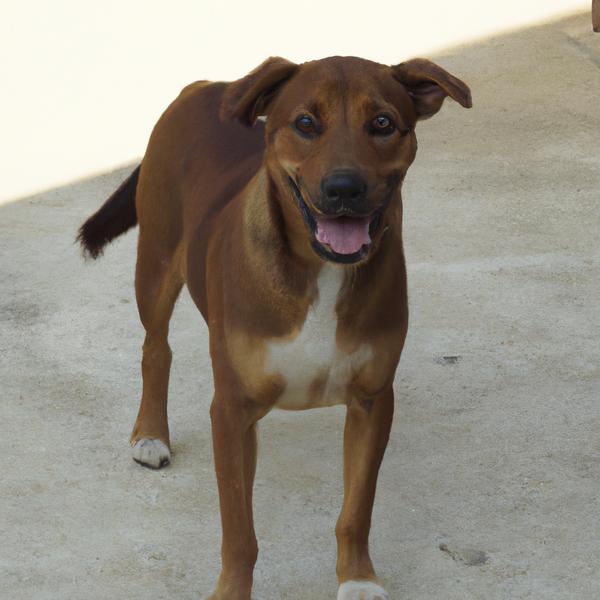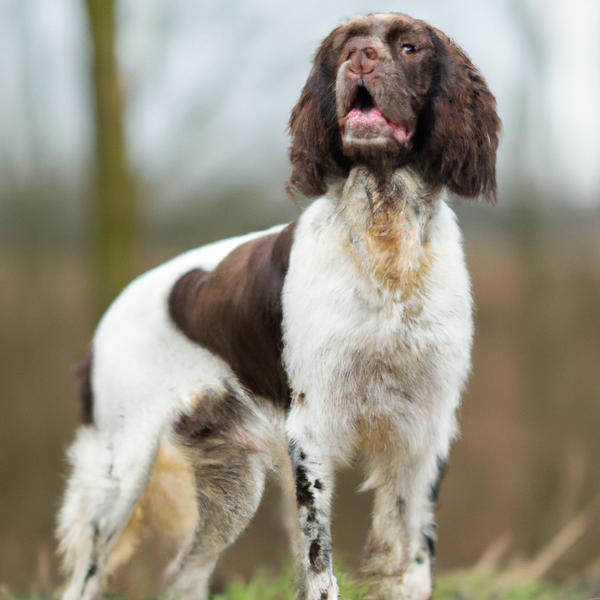
Rottle Breed Information & Characteristics
Hypoallergenic
Are Rottles Hypoallergenic?
Unfortunately, the Rottle is not hypoallergenic, making it not a good choice for a dog lover who suffers from pet allergies.
Temperament
What is a Rottle personality? What are Rottle dogs best known for?
Active
Independent
Protective
Alert
Courageous
Intelligent
Loyal
Trainable
Fearless
Good-natured
Faithful
Instinctual
Shedding Level
Are Rottles heavy shedders? How Much Does a Rottle Shed?
Rottle dogs are low shedders. The coat sheds an average amount and doesn't require much care.
Watchdog Ability
What is the watchdog ability of a Rottle dog?
Rottles are very good watchdogs. They are a vocal breed, and are wary of outsiders, so if someone approaches your home or aims to intrude, the Rottle is going to make sure everyone knows about it.
Origin
Where do Rottles come from?
Germany
Ancestry
What are Rottles descended from?
Poodle, Rottweiler
Date of Birth
When were Rottles first bred? How old is the Rottle breed?
1980s
Eye Color Possibilites
What color are Rottle eyes?
Brown
Nose Color Possibilites
What color can Rottle nose be naturally?
Black
Coat Color Possibilites
What color can Rottle coat be naturally?
Black
Gray
Brown
Red
Cream
Blue
White
Pied
Coat Length
How long is a Rottles coat?
The coat of a Rottle is longer than that of the typical dog.
Coat Density
How Dense Is The Rottle Coat?
Coat Texture
What is the texture of the hair of a Rottle?
Curly
Litter Size
How many puppies can a Rottle have in a litter? How many puppies can a Rottle have in her first litter?
A Rottle can have a litter of 8-12 puppies on average. However, it's worth noting that the size of the litters can vary greatly. Factors that can influence litter size include the health of the mother, breeding history, and genetics.
Adaptability
The adaptability of Rottle dogs is a well-known trait, they are known for being able to adjust well to different living environments and lifestyle changes.
Health Issues
Do Rottles have a lot of health problems?
The Rottle is generally considered to be healthy. However, like all breeds, they are susceptible to certain health issues and it is important to keep an eye out for them and address them with your veterinarian as needed.
Major Concerns
What are the major health concerns to be aware of when owning a Rottle?
Patellar Luxation
Hip And Elbow Dysplasia
Subaortic Stenosis
Mitral Valve Dysplasia
Gastric Dilation Volvulus (GDV) or Bloat
Minor Concerns
What are the less significant issues to keep in mind when it comes to Rottles?
Sebaceous Adenitis
Von Willebrand's Disease
Osteochondritis Dissecans
Progressive Retinal Atrophy (PRA)
Occasional Tests
What are the occasional tests recommended for Rottle breed?
Eye Examination
Skin Evaluation
Cardiac Ultrasound
Blood And Urine Analysis
Diagnostic Imaging
DNA
Energy
Do Rottles have a lot of energy?
For those who lead a balanced lifestyle, Rottles may be a good choice as they have an average energy level.
Social Needs
Do Rottles need socialization? How social are Rottles?
Rottle have very high social needs. These needs include regular mental and physical stimulation, a job or purpose, and companionship. They thrive in environments where they have a lot of interaction with humans and other dogs.
Exercise Needed
How much exercise should Rottles get?
The Rottle dog needs significant physical activity to maintain a healthy lifestyle. They are also well-suited for those who lead an active lifestyle and enjoy activities such as running, hiking, or other outdoor pursuits.
Sleeping Need
How much sleep should a Rottle have? Do Rottles sleep a lot?
Rottles dogs are tend to sleep less than other breeds, but they still require adequate sleep to maintain good health.
Tendency to Bark
How much does it bark?
Rottles tend to bark moderately, they bark when necessary, such as to alert their owner or to communicate something. They may also bark due to certain triggers like fear, alarm, boredom, greeting, separation anxiety and compulsive barking.
Mouthiness
Are Rottles mouthy?
Roaming urge
What is the likelihood of a Rottle running away? Do they have a tendency to explore or wander frequently?
Prey Drive
Do Rottle dogs have a high prey drive?
Activity Level
What is the energy level of a Rottle? How much energy does a Rottle have?
Rottles are high-energy dogs. They need mental as well as physical exercise. These dogs require a lot of your involvement and without it they can, and will, become problematic dogs.
Tolerance of being left alone
Walks per Week
How far should a Rottle walk each week? How many miles should a Rottle walk every week?
There's really no limit to how far you walk your dog as long as they're comfortable. For Rottle, it's at least 14 miles / week. Just remember to build distance and stamina gradually over time.
Activity per Day
How much a Rottle should exercise a day? How much activity does a Rottle need?
In general most Rottles usually need at least 90 minutes of exercise daily. This can be spread across the day and include all sorts of high-energy activities, like walking, running and playing.
Grooming
What level of grooming should be provided for a Rottle?
The Rottle is a breed of dog that requires an average amount of grooming effort.
Brushing Frequency
How often should you brush a Rottle?
Ideally, Rottle should be brushed at least 2 or 3 times a week (preferably daily) improve shedding.
Brushing Tools
What are the most commonly used brushing tools for Rottles?
Pin Brush
Comb
Clipper
Nail Clipper
Cups
How many cups of food does a Rottle eat?
For an average 60-100 pound (27 - 45 kg) Rottle feed 3.5 cups daily. But, keep in mind, the amount you feed is going to be dependent on the quality of the food you are feeding.
Daily Cost
How Much Does a Rottle Cost Daily?
The average cost of a Rottle is somewhere $3.40 - $4.50 per day.
Monthly Cost
How Much Does a Rottle Cost Per Month?
The average per month expenses of a Rottle is between $101 - $134. This makes an average of $1212 - $1608 per year. It will be on the higher side when the dog is still small because it will need more frequent visits to the vet, shots.
Intelligence
How intelligent is a Rottle?
The Rottle breed is considered very intelligent and easy to train.
Sensitivity Level
How sensitive is a Rottle dog?
This dog breed is more sensitive than others and easily overwhelmed by new surroundings and people. They need gentle handling and a calm, stable home environment with positive reinforcement training.
Affection Dependance
Are Rottle dogs affectionate?
Apartment Friendly
Do Rottle do well in apartments? Are Rottles good indoor dogs?
The Rottle is an apartment-friendly dog breed. They can do perfectly well in apartments providing they are sufficiently exercised and taken out and about as part of their owner's daily lifestyle.
Child Friendly
Are Rottles good with kids? Are Rottles good around children?
Rottles are kid-friendly dogs. They are good with children and excellent dogs with children if they are socialized and trained at a young age.
Senior-friendly
Are Rottles good for elderly?
Cat Friendly
Are Rottles good with cats? How friendly Rottles are toward cats?
Rottles are one of the best dogs for cats. They're accept cats readily as part of the family. However, this dog breed should be trained to not chase after the kitty early on
Dog Friendly
Do Rottle dogs get along with other dogs? Are Rottles OK with other dogs?
Rottles are average friendly towards other dogs. If they are raised with other dogs, they are likely to get along with them. And, if they are socialized properly from a young age, they will usually be great with other dogs.
Pet friendly
How do Rottle dogs interact with other pets? Are they considered pet-friendly?
Stranger Friendly
Are Rottles friendly with strangers?
Rottles are average friendly around strangers. They can be wary around strangers and a little standoffish. Early socialisation is key.
Playfulness
Do Rottles like to play? Are Rottles playful?
The Rottle is a playful dog. So, no matter how busy the day may get, the best thing you can do for your Rottle is to make time each day to play. It can be as little as 15-20 minutes, and it will mean the world to them.
Trainability
Are Rottle easily trained?
Rottle dogs are known for their ease of training and ability to learn quickly, making them a popular choice for pet owners and trainers alike.
Compare Rottle with other breeds

Boxspring
Rottle vs Boxspring

Maltipom
Rottle vs Maltipom

Chinaranian
Rottle vs Chinaranian

Bosapso
Rottle vs Bosapso

Shethund
Rottle vs Shethund

French Mastahoula
Rottle vs French Mastahoula

English Toy Chin Spaniel
Rottle vs English Toy Chin Spaniel

Crested Cocker
Rottle vs Crested Cocker

BD Terrier
Rottle vs BD Terrier

Rottweiler
Rottle vs Rottweiler

Spanierd
Rottle vs Spanierd

Hava-Jack
Rottle vs Hava-Jack